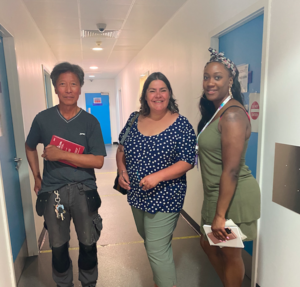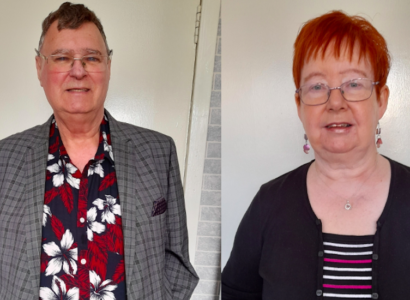
It’s been a little while since I have been in a custody suite, so it was time to dust off my work shoes (I work from home so flip flops are generally acceptable!) and get into the cells. Massive thanks to the team at MOPAC and the two lovely Independent Custody Visitors (ICVs) who let me shadow them for a visit in (very hot) London. It was great to see the ICVs in action and to have a chat with custody staff.
Who are ICVs?
ICVs are members of the public who volunteer to make unannounced visits to police custody to check on the rights, entitlements and welfare of those detained. There are over 1,200 ICVs in the UK making these visits, in their own time. What an incredible bunch they are!
How do visits work?
So, to the visit. We were welcomed into the suite by a detention officer (DO) who was visiting that day from a suite elsewhere in London as their ‘home’ suite was closed. The ICVs in London make paper-based notes at the time of the visit, raise issues with the Custody Sgt there and then, and then complete their reports online, offsite, after the visit (other schemes may use paper-based forms, or record the visits on iPads or similar depending on location).
The DO printed off two lists of those in detention, one redacted one for the ICVs and a full copy for herself, detailing who was in custody that day and a few details in terms of whether an AA had been called etc.
ICVs then were walked around the suite to speak to detainees. The DO would initially open the hatch and see if the detainee was in cell, and if they were, if they were awake. If there was a detainee present, she let the detainee know that there were some non-police personnel here to speak to them, open the cell door and let the ICVs introduce themselves.
What sort of things are discussed?
ICVs run through a series of questions, checking that detainees have had their rights such as someone being told where they are, ensuring that detainees know why they are being held in custody and more. The ICVs then ask about detainee wellbeing and check on entitlements, making sure that detainees know they are able to have access to books, checking that they have had food and drinks, checking that if a detainee has been in cell for a long period, they may be able to have a shower and so on.
Issues spoken about on this visit ranged from requests for books, time in the exercise area, requests to see healthcare due to injuries/ongoing health conditions and more. What was striking about the visit was the interpersonal skills of the ICVs. Some of the detainees were more forthcoming than others, some had complaints about custody, and some were very engaged from the outset. The two ICVs I was shadowing were able to talk to all detainees respectfully, engaging detainees from the outset and get a good overview of their treatment whilst in custody. My two ICVs are non-judgemental and kind to the detainees, with an excellent knowledge of custody and custody processes to ensure that detainees have all they need or are entitled to.
Once all detainees who were able to be spoken to had received a visit if they wanted to (very few declined), the ICVs checked on stocks of custody meals, menstrual care products and other items. They noted that stocks were very low on a couple of items and made a note to ensure effective stocks were replenished.
How are any issues rectified and how does the visit end?
The accompanying officer takes note of any issues that need to be rectified throughout the visit, such as requests for books, the note on stocks etc. so that she can attend to them at the end of the visits to the cells. The ICVs then meet away from the booking in desk with a custody Sergeant and the DO to discuss the visit and give feedback. He ensures that actions will be followed up and makes a note of anything requiring his intervention.
Once the ICVs are satisfied that all issues and detainee needs will be followed up, they leave the suite and head off to input their report of the visit which in this case will go to the Mayors Office for Policing and Crime (MOPAC) who manage the volunteers and use their reports to hold the Metropolitan Police Service (MPS) to account for detainee treatment in custody.
It is always a pleasure to see the volunteers in action, and there is no doubt that the detainees that these ICVs spoke to had benefitted from their visit. Volunteers are incredible, and my heartfelt thanks go to all ICVs for their dedication and professionalism.
I am interested in becoming an ICV – how can I find out more?
If you are interested in volunteering as an ICV, please do check out the website of your local Police and Crime Commissioner (Mayor, Scottish Police Authority or Northern Ireland Policing Board area depending) to get details of your local scheme, vacancies and how to apply. If you are not sure how to find your local scheme, you can email [email protected] being sure to include what area you live in, and we are more than happy to put you in touch!




